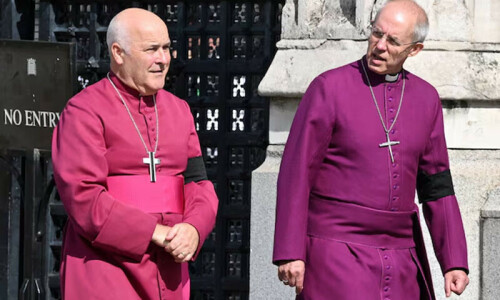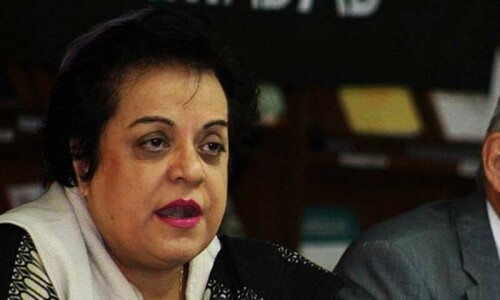RIYADH, Jan 19: When the Saudi King sat across the President of the US, it was not just a meeting of two world leaders; it was a meeting between the world’s largest crude producer and the largest consumer. And with oil prices rallying around the $100 mark, it was but natural that the issue would figure in discussions - rather prominently. And so it did.
And thus when President Bush landed here, oil markets remained glued to the otherwise desolate place of Janadriyah – some 40kms out of the city - for the deliberations were to have immense impact on the volatile crude markets.
Speculations had been rife in the media, whether President Bush would personally take up the issue of crude prices with the king. Some reports initially said the president may not broach the issue and instead would prefer to leave it to energy secretary Sam Bodman, who visits the Kingdom later this month just a few days before the Opec Feb 1 meeting in Vienna.
However, with crude prices crossing one hurdle after another and winds of recession reaching the US shores, it was not possible for the President not to take up the subject with the king - publicly as well as privately. And this is what he did.
He publicly pleaded with the Opec to open up taps, so as to tame the rising prices. “I would hope, as Opec considers different production levels, that they understand that if …one of their biggest consumers’ economy suffers, it will mean less purchases, less oil and gas sold,” Bush told reporters at the Royal Palace in Riyadh during an impromptu press conference.
“What’s happened that demand for energy has outstripped new supply and that’s why there’s high price,” Bush emphasised.
And the President didn’t stop there. He also took up the issue of oil prices with the king directly too in private discussions, White House spokesperson revealed aboard Air Force One as the president flew to Egypt from Saudi Arabia.
White House Press Secretary Dana Perino said the private conversation may have yielded some daylight.
“The king says that he understands the situation. He’s worried about high oil prices and how they can negatively affect economies around the world,” Perino said aboard the presidential jetliner.
“The president said there’s a hope that as a result of these conversations that Opec would be encouraged to authorise an increase in production and to help deal with the tight supply problems in this time when we have growing economies across the world, especially in China.” The US request to open up the taps was, however, accompanied by news of a faltering market and weakening demand.
Oil slid more than $2 to below $90 on Wednesday, for the first time since mid-December, due to a large rise in crude stocks in the US amid signs that slowing US economic growth was eroding fuel demand.
The US government data showed crude oil stocks rose for the first time in nine weeks going up by 4.3m barrels to 287.1m barrels in the week ending Jan 11.
The International Energy Agency on Wednesday also cut its 2008 global demand growth forecast by 130,000 barrels per day to 1.98 million bpd and said it may lower the figure further.
Coupled with this was a jump in Opec production in December, rising to an average of 32.03 million barrels per day (b/d) of crude oil in December, a Platts survey of Opec and oil industry officials said. This was up from November’s average output of 31.65 million b/d.
Production from Opec’s 10 members bound by crude output agreements averaged 27.43 million b/d in December, the survey showed. This was 460,000 b/d more than in November and 177,000 b/d higher than the group’s 27.253 million b/d target which came into effect at the beginning of November.
The softening of the market was also indicated when the US commerce department said on Tuesday the country’s retail sales fell 0.4pc in December. It was evident that not even holiday shopping could encourage wary consumers to spend freely. Prospects about the US slipping into a recession thus seemed gathering. Opec thus needed to be cautious.
Responding to President Bush’s request, Saudi Oil Minister Ali al-Naimi said Opec would raise the production — only if the market justified.
Clarifying his statement, the Opec heavyweight emphasised crude producers’ would take crude-oil stockpiles in consuming countries into account when making its next output decision.
However, speculators are currently adding around $20 to $30 to the price of a barrel of oil, Ali al-Naimi emphasised before reporters.
Hence despite the pleas of President Bush and the upcoming visit of Mr Bodman to somehow influence Opec decisions, it may not be very easy for the Opec to accept the request.
After all Opec needs to protect and safeguard producers’ interests and this is what Mr Naimi seems to have been doing despite calls from Washington.















































Dear visitor, the comments section is undergoing an overhaul and will return soon.